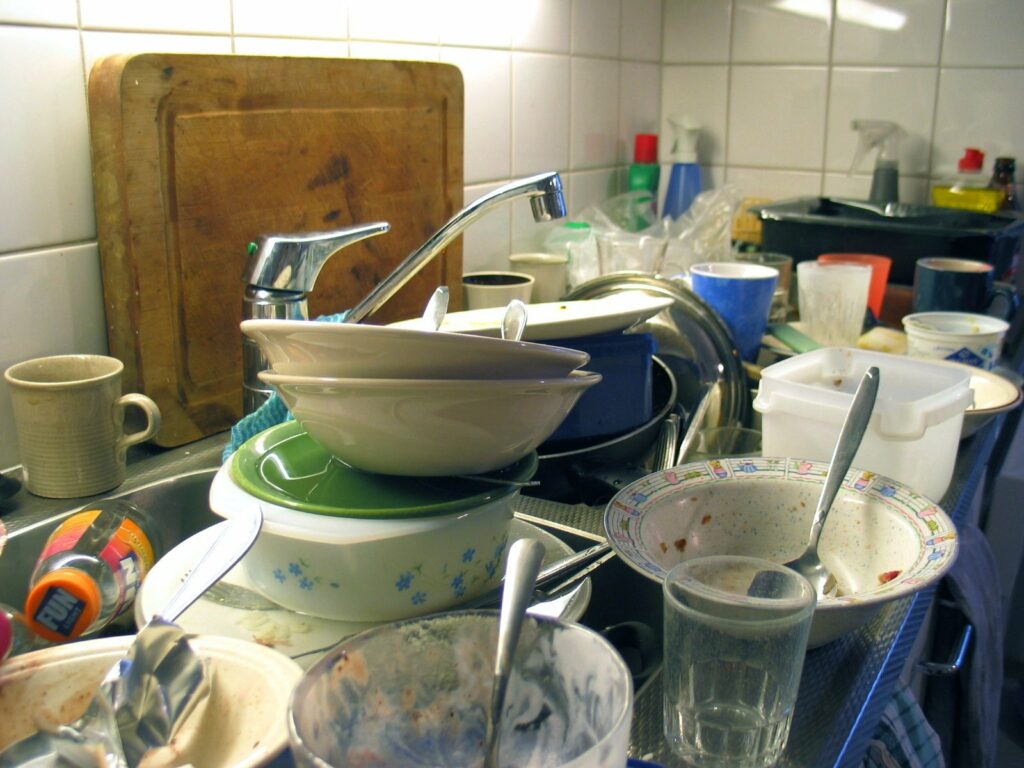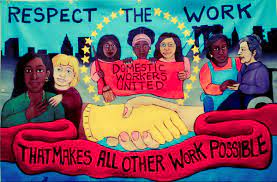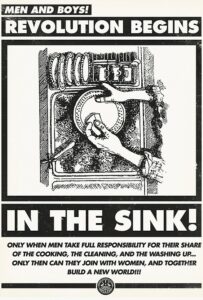
by: Cat Fein
“Everybody wants a revolution, but no one wants to do the dishes.” This quote is typically attributed to Dorothy Day of the Catholic Workers or P.J. O’Rourke, who has a quote in a similar vein. O’Rourke’s true quote is, perhaps, most applicable for this article. “Everybody wants to save the Earth; nobody wants to help Mom do the dishes.”
In this article, we will explore the labor struggles of the unpaid domestic worker: parents, spouses, significant others, and any and all other home care workers and home makers. There are two obvious tropes unpaid domestic workers, usually mothers and femme folks, face in today’s society: the happy homemaker and the downtrodden housewife. I’d like to offer a more complex, optimistic, and yet, more tragic perspective.
Capitalism at its very core defines one’s worth by the quantity and quality of labor contributed, and yet this same system unethically devalues one of society’s most difficult and labor-intensive jobs: domestic work. In a society that blames juvenile delinquency on parental failings, those very same parents are given few resources and little assistance in raising their kids. Choosing to stay at home to better rear children and keep the household running smoothly (and cleanly) comes with so many short-term consequences and such distant long-term benefits that many defer the majority of these responsibilities to daycare, babysitters, and/or professional housekeeping services. These paid domestic workers are often also women. They often earn low wages with little opportunity to rear, socialize, and educate their future generations and/or opportunity to keep their own home tidy enough for parents to do those things themselves.
Many child advocacy groups, child development teachers, doctors, nurses, pediatricians, therapists, religious centers, other parents, and statistical studies and surveys from around the world indicate that having at least one parent at home during early childhood can significantly benefit children all the way through adulthood. However, we must take a closer look at the realities current stay-at-home parents face.

First and foremost, childcare and the household labor that comes with it (chores/cleaning, budgeting, appointments, bill paying, household inventory, appliance and car maintenance, meal prep and cooking, shopping, and general organization to name a few tasks) are still not seen as real work when a stay-at-home parent is the laborer. Despite the fact that a stay-at-home parent does the work of at least three different professional workers, there is little to no consideration for the exhausting effort these tasks entail. In fact, the moment I tell someone I am a stay-at-home parent, I face one of many disparaging statements: “You’re so lucky. I wish I would just stay at home all day.” “It’s amazing that you gave up your career for this.” “Isn’t motherhood the best? And you’re balancing so well. I bet you have always wanted to be a mom.” “Your husband must have a great job to LET you do that.”
In most situations, I feel the societal pressure to respond to these kinds of comments with placid niceties. Yes, I am very lucky. My family is healthy. I am grateful that I can be with my child and guide and influence him as he grows. Slowly, I am left with a creeping sense of righteous indignation. Yes, I sacrificed a career I spent a lifetime building to ensure my family was in a good place emotionally, physically, and financially. It is an amazing experience, but I was a childfree advocate until I was almost thirty. If I had a realistic and sensible opportunity to return to work, I might do that.
I might return to work simply because I don’t accrue Social Security, have no opportunity for health, dental, or life insurance, and don’t receive a paycheck, so I can’t afford to purchase them in the market. If something tragic should befall me, my husband and child will receive no benefits other than those I accrued before pregnancy. My spouse has a good enough job that leaves us, by government standards, just above the poverty line. We budget, penny pinch, home make as much as we can, and go without when necessary. The wages I could make homemaking or childcaring for someone else would elevate us enough to build a substantial savings, buy a newer, safer car, and build a college fund. If we subtract the cost of childcare, with mental and emotional aspects in mind, I would be working just to cover the cost of letting someone else raise my child. The Washington Post paired with the company Mint in a 2012 article penned by Janice D’Arcy about unpaid domestic work. They analyzed all the tasks done by the average stay-at-home parent and totaled up what would be a much more generous earning statement: $96,261(USD) would be the total for the myriad of tasks done “professionally” rather than for free by the stay-at-home parent. How is it, then, that we can so undervalue the physical, mental, and emotional labor involved in being a domestic worker or stay-at-home parent?
The answer is simple, and I’ll spell it out for you: R-E-S-P-E-C-T. Respect, or rather, lack of respect, for stay-at-home parents leads to these kinds of disparities. Under this logic of disrespect, “staying at home” implies that I am weaker, less talented, less intelligent, less creative, less driven, less able, and, ultimately, LESS THAN.

If I weren’t, I’d work a PROPER job. I would be seeking compensation if I really believed I did any REAL WORK. This final reality permeates every class, every political identity, every conversation, and most people. I can’t tell you how many so-called “woke” leftists, especially left-leaning men, write me, my opinions, my talents, and my skills off after they realize I’m JUST a stay-at-home mom. This aligns perfectly with the idea the State has about stay-at-home parents: we are useless, lazy, unemployed, and not really members of a productive class. Conservatives approach these same ideas with a more gendered approach: staying at home is women’s work (because women are implied to be less than) and men shouldn’t do women’s work, lest they be seen as women, and ultimately, LESS THAN.
If you don’t respect the hard work of raising children, you are setting society up for many long term problems: trauma, teen suicide, school shootings and violence, school-to-prison pipelines, childhood abuse, and billions of dollars of therapy. If you commodify child raising and domestic skills, without paying parents and other caregivers for doing the work at home, you are rewarding anything and everything over “family”. We are pressured to sell the skills we could use at home to others; then, in turn, pay others to raise our children using these same skills that we just sold to someone else. Even if you set aside the sometimes devastating financial costs, we can clearly see the pitfalls that accompany this model. If we can’t join the rest of the world in respecting families and honoring people’s choices to care for their own families, we are doomed to generations of people who endure disconnection, abuses, and poverty for no real reason. We deserve the right to raise our children and care for our families with compensation for the labor we contribute to society. We deserve compensation and benefits for our labor. The cost of not compensating domestic workers pales in comparison to the costs of refusing to recognize our work. We deserve respect for our labor.


